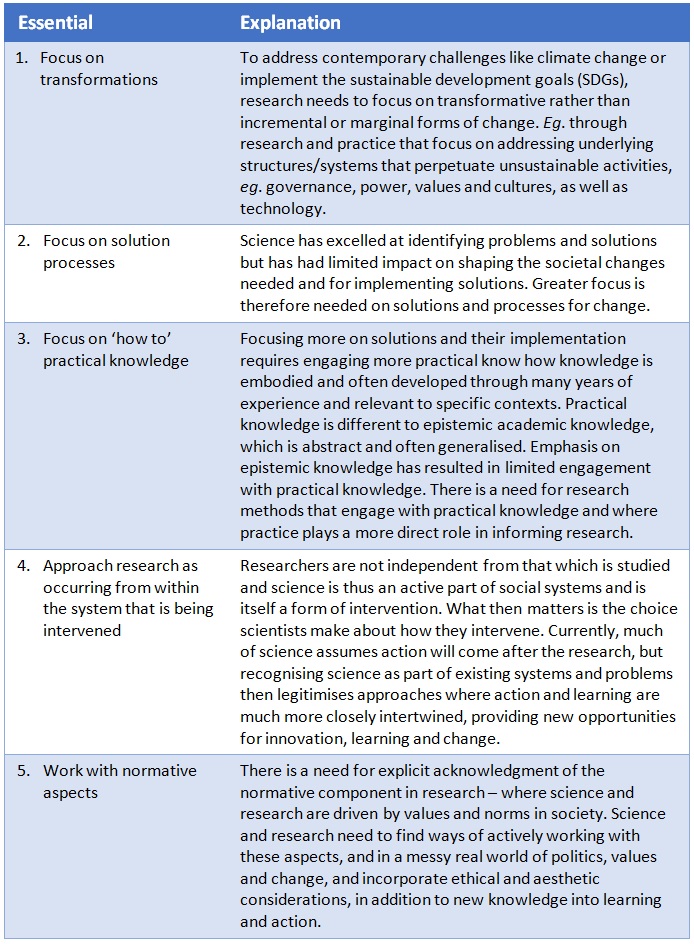Blog #13: Action-Oriented Research
/Roughly a year ago, my good friend Ioan Fazey and I were hiking the Cairngorm Mountains in Scotland and planning for the upcoming Transformations 2017 conference. With a long (42k) bike ride to the “bothy", we had plenty of time to discuss the upcoming conference and how to integrate aspects of a recent paper that Ioan and I wrote together. The paper was under review at the time of the conference so we had to be thoughtful about what we could present, yet believed the paper (recently published) could be a game changer. Here are some thoughts that we chewed on while hiking through the heather, thistle and spectacular vistas:
What can we learn when we bring together different insights from the rich and diverse traditions of action-oriented research? Will this help us more effectively understand and navigate our way through a world of change to ensure knowledge production contributes more directly to societal needs?
(Fazey et al., 2018) <<Click here to download the new paper.
In a recent publication , we explored the critical question of how to develop innovative, transformative solutions and knowledge about how to implement them. Addressing these questions requires much more engagement with more practical forms of knowledge, as well as learning from action and change in much more direct ways than currently occurs in academia. It is like learning to ride a bicycle, which can’t be done just by watching a powerpoint presentation, and which requires learning by “getting hands dirty” and by falling off and starting again.
Learning about how to achieve transformative kinds of change requires learning by doing in the real world of practice where researchers acknowledge they are part of the systems (and problems) that need changing. Approaches are therefore needed that:
· allow for inclusion of a much wider diversity of kinds of knowledge and ways of knowing
· free researchers up to more directly learn from actions seeking to promote change
· facilitate thinking about wider systemic issues that may be constraining possibilities for transformations.
In our paper, we focused on achieving changes towards more sustainable patterns of living and highlighted ten essentials for research and science to have greater impact. These essentials are:
1. Focus on transformations to low-carbon, resilient living
2. Focus on solution processes
3. Focus on ‘how to’ practical knowledge
4. Approach research as occurring from within the system being intervened
5. Work with normative aspects
6. Seek to transcend current thinking
7. Take a multi-faceted approach to understand and shape change
8. Acknowledge the value of alternative roles of researchers
9. Encourage second-order experimentation
10. Be reflexive.
These are illustrated in the circular image. The two-part table at right provides an explanation for each of the ten essentials.
Ioan Fazey
Ioan Fazey is Professor of Social Dimensions of Environmental Change at the University of Dundee in Scotland, United Kingdom. He is actively involved in helping support and facilitate the emergence of a growing field of research on action on Transformations to Sustainability. He is also a founding member and steward of the Sustainable Development Goals Transformation Forum, and trustee of H3Uni, an action oriented organisation that seeks to promote transformative thinking.
While applying any of these essentials will help improve possibilities for learning about sustainability and transformative change, the greatest impacts will be achieved when the essentials are applied together. This will create a much more adaptive, reflexive, collaborative and impact-oriented form of research, as well as intellectual depth that enables integration of knowledge with normative considerations of what is considered to be good (ethics) and beautiful (aesthetics).
We would love to hear your thoughts about this and other related work. What has your experience been of research seeking to achieve change? Do the ten essentials resonate? What’s missing? How can we put these essentials into practice? How can the kinds of changes to the way knowledge is produced and used and advocated in this work be better supported?
To find out more:
Fazey, I., Schäpke, N., Caniglia, G., Patterson, J., Hultman, J., van Mierlo, B., Säwe, F., Wiek, A., Wittmayer, J., Aldunce, P., Al Waer, H., Battacharya, N., Bradbury, H., Carmen, E., Colvin, J., Cvitanovic, C., D’Souza, M., Gopel, M., Goldstein, B., Hämäläinen, T., Harper, G., Henfry, T., Hodgson, A., Howden, M.S., Kerr, A., Klaes, M., Lyon, C., Midgley, G., Moser, S., Mukherjee, N., Müller, K., O’Brien, K., O’Connell, D.A., Olsson, P., Page, G., Reed, M.S., Searle, B., Silvestri, G., Spaiser, V., Strasser, T., Tschakert, P., Uribe-Calvo, N., Waddell, S., Rao-Williams, J., Wise, R., Wolstenholme, R., Woods, M. and Wyborn, C. (2018). Ten essentials for action-oriented and second order energy transitions, transformations and climate change research. Energy Research and Social Science, 40: 54-70. Online (open access): https://www.sciencedirect.com/science/article/pii/S2214629617304413





